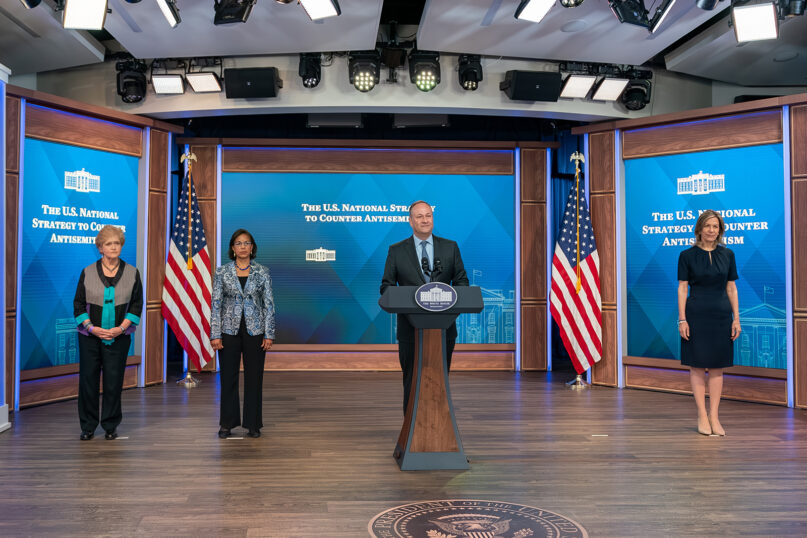(RNS) — There have been some less-than-enthusiastic reactions to the Biden administration’s strategy to counter antisemitism in the U.S., which was rolled out at the end of last month.
The detailed 60-page document aims to increase awareness of antisemitism, particularly how it threatens American society. It proposes broadening appreciation of Jewish American heritage, improving Jewish communities’ safety and security, countering the normalization of antisemitic discrimination and building “cross-community” solidarity and collective action to counter hate.
What’s not to like?
Well, according to some, several things. For starters, the White House plan doesn’t explicitly adopt the International Holocaust Remembrance Association definition of antisemitism, which has been embraced by many Jewish organizations and countries around the world. Instead, it simply calls it “the most prominent” definition, but “welcomes and appreciates” as well a somewhat less encompassing alternative known as Nexus.
While the Nexus definition does declare that “it is antisemitic to promote myths, stereotypes or attitudes about Zionism and/or Israel that derive from and/or reinforce antisemitic accusations and tropes,” it also asserts that “paying disproportionate attention to Israel and treating Israel differently than other countries is not prima facie proof of antisemitism.”
The critics would beg to differ.
Then there’s the problem that in the appended fact sheet the Council on American-Islamic Relations is described as an organization that “will launch a tour to educate religious communities about steps they can take to protect their houses of worship” and “develop … strong relationships with other faith communities.”
CAIR has famously been held to account for some of its representatives’ ugly rhetoric condemning Israel and “Zionists” (the contemporary stand-in for the “J” word). Its San Francisco executive director, to cite one example, condemned “Zionist synagogues,” the ADL, Hillel and other Jewish organizations as “enemies” that foment Islamophobia. He has also sought to spread the canard that the Israeli military trains American police to “kill unarmed black men, women, and children.”
The director of CAIR’s Los Angeles chapter, for his part, derided what he called the “false historical allegation” that Jews have an ancestral connection to “historic Palestine.”
All this prompted the Zionist Organization of America, the World Jewish Congress, the Republican Jewish Coalition and others to complain about the White House effort. The RJC’s CEO, Matt Brooks, said that “Joe Biden had a chance to take a strong stand against antisemitism and he blew it.”
The White House plan, though, while it does “welcome and appreciate” the Nexus definition, clearly states that the more encompassing IHRA definition was in fact effectively adopted earlier by the Biden administration. In January, 2022, Secretary of State Antony Blinken declared that the U.S. “enthusiastically embraces” that definition.
As far as CAIR goes, no less a personage than Deborah Lipstadt, the U.S. special envoy for monitoring and combating antisemitism, defends its inclusion in the anti-antisemitism document’s appended fact sheet, while acknowledging the Muslim group’s past sins.
“CAIR,” she said, “was one of the organizations that stepped forward in support (of the administration plan) and it’s (therefore) mentioned in the fact sheet, as well as many other organizations.” She asserted that the group should be given the chance to prove itself changed. “We’re going to judge you by what you say going forward,” she told the Jerusalem Post. “We’re going to evaluate what you do henceforth.”
Asked directly if any organization that speaks in a way that may be perceived as antisemitic will be banished from the strategy, she offered an unequivocal yes.
Invoking the Jewish tradition’s belief “in forgiveness,” Lipstadt added, “if (CAIR is) really willing to change … then they are welcome.”
“If” is a deceptively small word; it carries a large meaning, and it must be said the signs aren’t good. The group’s New York chapter recently came to the defense of a student speaker at the City University of New York’s law school graduation, who went on a tirade against Israel that was widely considered to have crossed the line into antisemitism. But hope must spring eternal.
From my perspective, there’s another Jewish ideal that should be operative here: “Hakarat hatov” — acknowledgment of the good. Appreciation, that is, of what deserves it.
Were I to have been tasked with writing a comprehensive strategy to fight antisemitism in the U.S., I might not have mentioned the Nexus definition or, even in a fact sheet, CAIR. But to criticize the entire effort and its 60 pages of details on the basis of those two things strikes me as untoward, reminiscent of Rodney Dangerfield’s comedic complaint that, when he wore one of the two ties given him by his mother-in-law, she huffed: “What’s the matter? You don’t like the other one?”
I am hardly insensitive to antisemitism, having experienced it in many ways over many years. But, whatever real or imagined faults in the final product of the administration’s determination and countless man-hours of work, what overwhelms any of the plan’s flaws for me is the fact that the government effort itself is unprecedented. Which leaves me with a deep feeling of hakarat hatov.
(Rabbi Avi Shafran is director of public affairs for Agudath Israel of America, a national Orthodox Jewish organization. He blogs at rabbishafran.com. The views expressed in this commentary do not necessarily reflect those of Religion News Service.)





